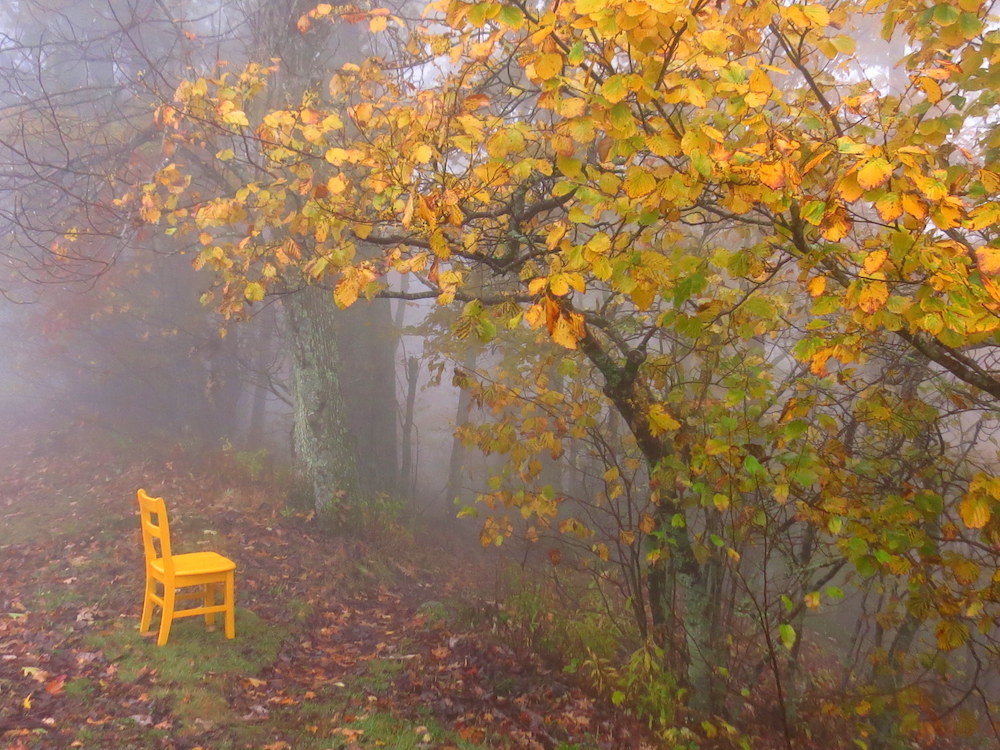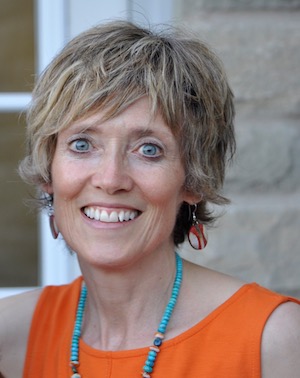Essay by Laura Sergeant
A Cure for Bewilderment

The moon hangs like an unnamed fruit, ready for plucking. In the weird, silver light of Palm Sunday morning, I skirt the edge of the woods. In these early days of the pandemic, they’ve closed the forests in the Dundas Valley, fifty miles west of Toronto. The bare trunks of April loom like an illogical fence. I sneak through the forest gates and descend into the ravine of my childhood.
This wild belly is a bit of a loophole—it borders the forbidden trail systems. What if everybody decided to hike down here? The question throws a shadow across my walk, because there’s no good answer. After weeks of obedient walks in my neighborhood, I don’t know why I’ve let my car drive me across town. When I was young, my mom introduced us to the idea that “just me, just this once” was faulty moral reasoning, and the family maxim (like Immanuel Kant) has been a killjoy ever since.
I’ve been turning circles like a wounded animal, chasing dead ends. I’m up early, I can go to the gym before work. Wait. No. Instead, I turn toward the familiar and short-circuit. It’s like the reflexes of bereavement—the impulse to call my mother and tell her she should start watching Grantchester on PBS, then remembering she’s dead.
The sky is now a stir of pink and purple and burnt orange—orange like the fire I set by trying to stick some croissant into my toaster this morning, a treat against tiny losses. The Farmer’s Market is too high-contact, so I’ve dispensed with tulips, rosemary goat cheese, artisanal bread, and chats with Chris at the organic veggie stand. I’ve cancelled my trip to New Zealand—a forty-year dream.
Everything pales against blistering death rates and financial hardships.
At work, abruptly, our outpatient mental health clinic was disassembled—rooms where I’ve provided therapy for teens with depression or anxiety or gender dysphoria were repurposed with hospital beds. Days at home doing therapy on my smartphone, I’ve tried to make up for the lost intimacy—the lost visual data—by jamming the phone hard into my ear. Between my hospital inbox and the news, it feels like the world is spinning faster than usual.
I slip toward the rough bark and white shavings of a stand of birch trees, pencil straight and sharp. I find myself wondering about the dead: my parents, my grandparents, the poet Mary Oliver. What would they be doing?
Branches are snapping ahead in the brush. I see a powder-blue coat and the tawny muscle of an off-leash dog, and call softly. The woman is startled.
“I’ve been down here every day for three years, and I’ve never seen anyone else.” She bends to clip the dog.
“I grew up here.”
We’re observing physical distance. It helps that I’m scared of dogs.
“Don’t tell anyone.” She wants her secret protected.
“Of course,” I promise.
I thought it was my secret.
They switch back, leaving me alone. Dormant grasses bleached by winter, pine needles faded to straw, rusty leaves in chalky clumps are punctuated by otherworldly color. I’m sorry I don’t have my camera.
Parrot-bright skunk cabbage twirls up from the mud floor. Its tips are plum. Sprays of emerald grass with periwinkle flowers aren’t bullies down here. Raspberry canes blush toward life. There are swaths of magenta bracts with weepy candy-cane necks, and thick bramble and rose stems puncture my jacket and catch my ankles. Fitting, that on Palm Sunday, the walk is thorny and uncertain as I bushwhack toward a sandy stream.
The path makes me remember: cross-country races; the unruly Nelson boys; a mythology of quicksand and the belief that there were seven hills and valleys to reach the other side—a destination beyond the possibility of arrival; the hike with a can of beans, matches, and no can opener; hours spent deciding how to cross a creek. Time didn’t budge until the streetlights came on, and we flew home like moths.
• • •
I rest on a creek bank beside the tangled ash carcass of a collapsed tree. I’m trying to digest the pandemic, the fragments. Maybe what I’ll remember is white. Powdery hospital workers—puffy mollusks in space suits with alien masks. The discarded gloves. Caskets stacked in a potter’s field. The skeleton ribs and dome ceilings of field hospitals. Snow swirling around the prime minister during his morning address. Snow falling and disappearing onto the tarmac like the dying. The empty shelves where soap, bleach, flour, and eggs used to rest. Toilet-paper memes. The scrubbing of my calendar as the vacation is deleted.
I stop narrating—stop trying to organize my experience—and come back to my surroundings. Decay pierced by spring. The sharp loam. The sparkle in my calf as I wind up a steep hill. The young sensation in my jaw with the weight of a heavy footfall. My scabbed knuckles rub inside my frayed gloves. I eavesdrop on the symphony of birds—shrieks and trills and wobbly throats as they flirt and sing and sail toward the next season. Their indifference to me is comforting. The woody coo of mourning doves and the two-note song of black-capped chickadees dip me into the sabbath of the backyard where I was a daughter.
I emerge from the woods and find my way along a childhood street—it’s wide without sidewalks and church-quiet. Every house rings with story. I used to babysit in that house fouled by the smell of menthol cigarettes. A mafioso in his silk bathrobe used to wait on his veranda for the Globe and Mail. The boy with three nipples lived there. Someone put up a chain-link fence, there, at the bottom of Howard’s Hill, where we used to toboggan into traffic. I remember the dad who wore pants belted up under his arms, old Mrs. Murray who spied on us all through curtains parted by her crooked finger, saving money for Archie comics and grape SweeTarts, wishing my coaster bike was a yellow ten-speed like Sabine’s.
I’m tearful on the small lilt of a hill toward the family home. Maybe it’s the orphan in me, looking for surrogates to guide me. I’m adrift in a boat without paddles, weary and underequipped. I want my parents to show up, each with an oar in hand, to row for awhile.
I turn to the news for hope, which is stupid. I scrawl health sites for the latest rules for living. I live-stream church services, in pajamas, as a marker for Sunday. I Google “How to write during a pandemic,” knowing there won’t be answers. I hunch like a question mark in front of my computer. I want a container for my confusion, my pitching mood, the mutating grief, but the page is formless. I’m unsure how to bear witness. It’s all detail without perspective—like postcards that arrive home long after you’ve returned.
• • •
Amid the galloping blooms and generous light of spring, grief wells up every April and waxes and wanes through June. My body remembers hospital vigils and death. Twenty-five years have piled up without my dad. Five years without my mom. I miss them so much, but I avoid the family home and neighborhood like an exposed nerve—too tender.
Yet, here I am.
I slow my walk. Stop and stare for a bit.
The virus demands a deep imagining of death. Mortality distilled from vapor into something sharp and crystalline. The crack of thin ice. A tumble into the dark. The tiny skin between here and what’s next. Eggs splitting open.
Struck by the fragility of breath, my lungs trail outside me like balloons on a string—all my loves tethered by string, numberless pastel balloons. I wonder who I am as the props of routine fall away. I wonder who I’ve been. Was I too casual with it all? Did I love fiercely enough?
I face the house, and time collapses. Now is consoled by then. The driveway, the birch tree, windows that held Block Parent signs, the front door as portal: Love is embedded in every turn of my head. And calm descends like a warm hand on my forehead with the assurance that everything will be okay.
In this season of isolation, I’m chasing the familiar. Familiar—of family.
I know why I’ve come here.
Art Information
- “A Throne of the Golden Kind,” “Blue Ridge Parkway Mountain Stream” and “On the Edge” © Patricia Joynes; used by permission.
 Laura Sergeant (she/her) is a writer and pediatric social worker who has published in the Globe and Mail, Dreamers Creative Writing, Understorey Magazine, and Please See Me. She was a 2019 Icelandic Writers Retreat finalist and 2018 gritLit festival runner-up. In her twenties, she pursued songwriting and was lead guitarist in several indie rock bands. These days, she unwinds in her garden or on the Bruce trail. Mortality and Canadian public-radio podcasts will prevent her from getting through her “must read” book list. She is currently working on a collection of life stories.
Laura Sergeant (she/her) is a writer and pediatric social worker who has published in the Globe and Mail, Dreamers Creative Writing, Understorey Magazine, and Please See Me. She was a 2019 Icelandic Writers Retreat finalist and 2018 gritLit festival runner-up. In her twenties, she pursued songwriting and was lead guitarist in several indie rock bands. These days, she unwinds in her garden or on the Bruce trail. Mortality and Canadian public-radio podcasts will prevent her from getting through her “must read” book list. She is currently working on a collection of life stories.
Follow her @laurahsergeant on Instagram.
